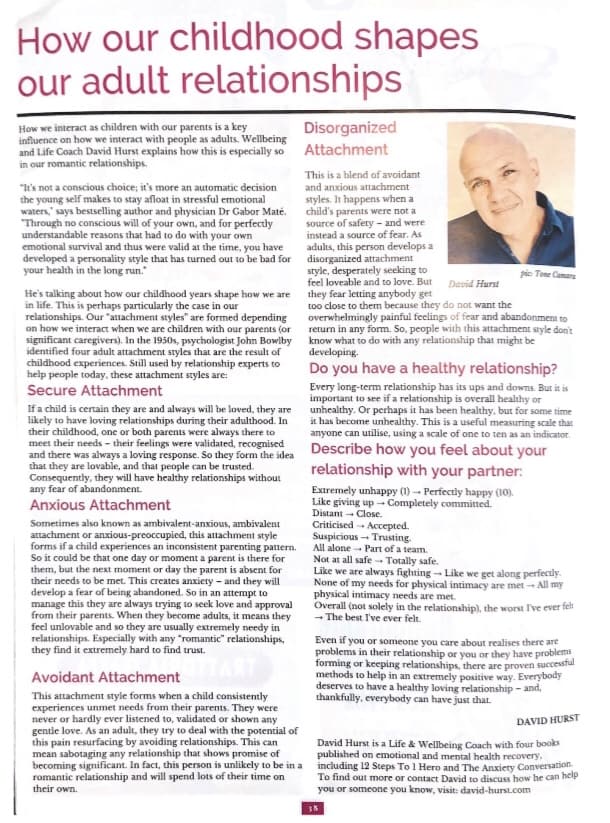Attachment styles – how our childhood shapes all our adult relationships

How we interact as children with our parents is a key influence on how we interact with people as adults. This is especially so in our romantic relationships.
“It’s not a conscious choice; it’s more an automatic decision the young self makes to stay afloat in stressful emotional waters,” says bestselling author and physician Dr Gabor Maté. “Through no conscious will of your own, and for perfectly understandable reasons that had to do with your own emotional survival and thus were valid at the time, you have developed a personality style that has turned out to be bad for your health in the long run.”
He’s talking about how our childhood years shape how we are in life. This is perhaps particularly the case in our relationships. Our “attachment styles” are formed depending on how we interact when we are children with our parents (or significant caregivers). In the 1950s, psychologist John Bowlby identified four adult attachment styles that are the result of childhood experiences. Still used by relationship experts to help people today, these attachment styles are:
Secure Attachment
If a child is certain they are and always will be loved, they are likely to have loving relationships during their adulthood. In their childhood, one or both parents were always there to meet their needs – their feelings were validated, recognised and there was always a loving response. So they form the idea that they are lovable, and that people can be trusted. Consequently, they will have healthy relationships without any fear of abandonment.
Anxious Attachment
Sometimes also known as ambivalent-anxious, ambivalent attachment or anxious-preoccupied, this attachment style forms if a child experiences an inconsistent parenting pattern. So it could be that one day or moment a parent is there for them, but the next moment or day the parent is absent for their needs to be met. This creates anxiety – and they will develop a fear of being abandoned. So in an attempt to manage this they are always trying to seek love and approval from their parents. When they become adults, it means they feel unlovable and so they are usually extremely needy in relationships. Especially with any “romantic” relationships, they find it extremely hard to find trust.
Avoidant Attachment
This attachment style forms when a child consistently experiences unmet needs from their parents. They were never or hardly ever listened to, validated or shown any gentle love. As an adult, they try to deal with the potential of this pain resurfacing by avoiding relationships. This can mean sabotaging any relationship that shows promise of becoming significant. In fact, this person is unlikely to be in a romantic relationship and will spend lots of their time on their own.
Disorganized Attachment
This is a blend of avoidant and anxious attachment styles. It happens when a child’s parents were not a source of safety – and were instead a source of fear. As adults, this person develops a disorganized attachment style, desperately seeking to feel loveable and to love. But they fear letting anybody get too close to them because they do not want the overwhelmingly painful feelings of fear and abandonment to return in any form. So, people with this attachment style don’t know what to do with any relationship that might be developing.
Do you have a healthy relationship?
Every long-term relationship has its ups and downs. But it is important to see if a relationship is overall healthy or unhealthy. Or perhaps it has been healthy, but for some time it has become unhealthy. This is a useful measuring scale that anyone can utilise, using a scale of one to ten as an indicator.
Describe how you feel about your relationship with your partner:
Extremely unhappy (1) → Perfectly happy (10).
Like giving up → Completely committed.
Distant → Close.
Criticised → Accepted.
Suspicious → Trusting.
All alone → Part of a team.
Not at all safe → Totally safe.
Like we are always fighting → Like we get along perfectly.
None of my needs for physical intimacy are met → All my physical intimacy needs are met.
Overall (not solely in the relationship), the worst I’ve ever felt → The best I’ve ever felt.
Even if you or someone you care about realises there are problems in their relationship or you or they have problems forming or keeping relationships, there are proven successful methods to help in an extremely positive way. Everybody deserves to have a healthy loving relationship – and, thankfully, everybody can have just that.

My article for Soltalk magazine.
